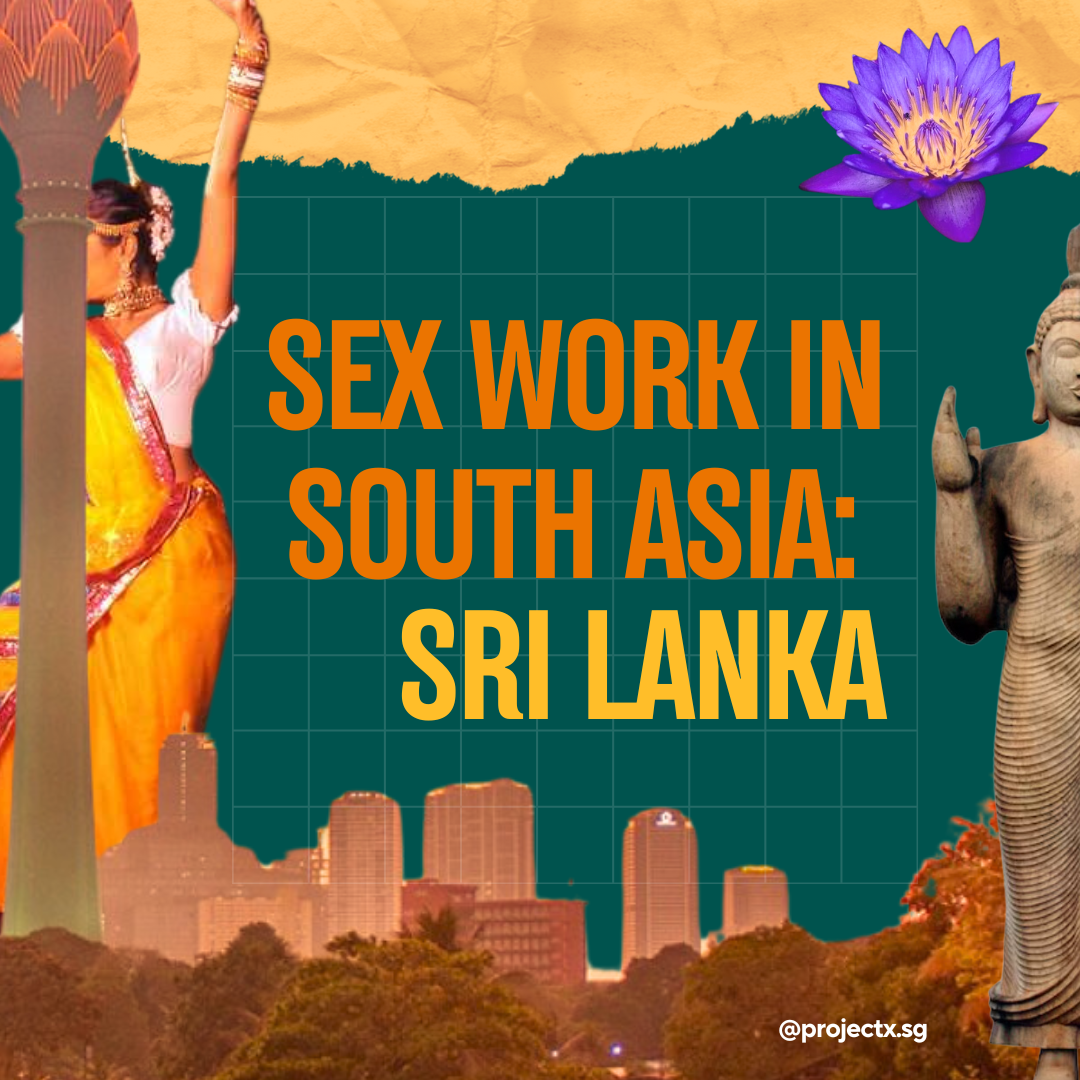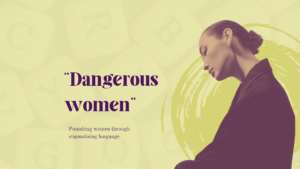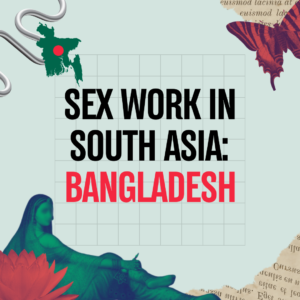Preface
This is the third post in Project X’s new series, Sex Work in South Asia – a series designed to encourage greater understanding of and dispel misconceptions about sex work in the South Asian region. This series will consider the state of the sex industry and sex workers rights in each of the following South Asian countries: India, Bangladesh, Sri Lanka, and Nepal. This post focuses on Sri Lanka. It will elaborate on the historical context and economic impact of sex work, sex worker statistics, sex work in Sri Lanka’s cultural context, and finally, the future of the sex industry in Sri Lanka.
Brief History
Law, Policy and Policing
Overview
Sex work is not criminalised in Sri Lanka, thanks to a landmark ruling by Fort Magistrate Ranga Dissanayake in February 2020. However, adjacent activities such as soliciting, brothel keeping, and living off earnings procured from sex work are criminalised. Sex work in Sri Lanka today is subjected to two main laws: the Vagrants Ordinance of 1841 and the Brothel’s Ordinance of 1889 (National STD/AIDS Control Programme, 2022). (These are supported by the Houses of Detention Ordinance of 1907, which sex workers are subject to but not explicitly targeted by.)
Vagrants Ordinance No. 4 of 1841
The Vagrants Ordinance is a colonial-era law that criminalises the act of soliciting, explicitly targeting “every common prostitute wandering in the public street or highway, or in any place of public resort” (“Laws of Sri Lanka”, 2014). However, it also criminalises vague offences such as ‘wandering’, ‘idling’, ‘acts of indecency’, or behaving in a ‘disorderly manner’. The broad definitions open the Ordinance up to misuse and moral policing by those who enforce the law in Sri Lanka; and hence this law is generally opposed by Sri Lankans (International Commission of Jurists, 2021). In 2021, 4 women were arrested for ‘idling’ under the Vagrants Ordinance, sparking a social media outcry and renewing calls to repeal the law (Sunday Times, 2021).
Brothel’s Ordinance of 1889
The Brothel’s Ordinance criminalises the management of brothels and leasing/leasing out one’s premises to be used as a brothel (“Laws of Sri Lanka”, 2014). While the legislation technically targets clients, brokers and pimps, in reality, the ordinance is often used as justification by the police to enter brothels to arrest women (Miller and Carbone-Lopez, 2013). According to Sex Workers and Allies in South Asia (SWASA), 53% of sex workers are engaged in brothel-based sex work; these are the workers who are most vulnerable to the abuse of the Brothels Ordinance (SWASA, 2023).
Prosecution of sex workers
Sex workers have reported that the Sri Lankan police uses condoms as evidence of engaging in sex work (despite the lack of legal basis) to stop, search, harass, and detain women (UNDP, 2015). Once arrested, sex workers are then commonly told to plead guilty and pay a nominal fine, allowing police to escape the burden of proving any actual offences, especially of ‘idling’ and ‘vagrancy’. As a result, close to 50% of the workers who were arrested, especially under the Vagrancy Ordinance, plead guilty. A significant number of sex workers have criminal records as a result of this practice (SWASA, 2023).
Violence, corruption, and sexual bribery
Because of the stigma against sex work, workers are often subjected to abuse and discrimination, many times by the very authorities who are supposed to protect them. 22% of sex workers have faced violence from clients and 11% from hotel and lodge owners; and many workers reported facing physical violence at the hands of their own children after they found out that their mother was a sex worker. However, most upsetting of all is that 10% of sex workers report having faced violence at the hands of police, including arbitrary detention; sexual violence on the street and in police stations (often by multiple officers); public humiliation; and trans sex workers being thrown in male holding cells, thus making them vulnerable to further sexual violence. One trans sex worker related an incident in which a group of policemen who stopped her on the road, forced her to undress and bathe in drain water on the side of the road. Generally all workers, both cisgender and trans, acknowledge that they try to avoid the police at all costs as they see them as the group of people who pose the biggest threat to their physical safety (SWASA, 2023).
Other than direct physical violence, police are also indirectly responsible for perpetuating violence against sex workers, as they often let clients, hotel owners and others in the service go scot free when they exploit and/or perpetrate violence against sex workers. In addition, they often unfairly target sex workers during raids, allowing clients, hotel owners, and others to go free while they arrest and harass the sex workers. Police may also routinely arrest workers on false charges such as those related to drugs. Workers are easy targets for the police to use to fill up their quota of arrests under numerous laws (SWASA, 2023).
On top of all this, sex workers also have to face an exploitative system of sexual bribery which is unfortunately well established among state actors. Many are forced to take police officers as clients for no money or less than the normal amounts in order to avoid harassment or violence. Apart from being a flagrant and shameful abuse of power, police officers are often the most unsafe clients for sex workers as they enjoy the most impunity in all aspects (SWASA, 2024).
Sex Worker Statistics and their Economic Impact
Sex worker population
Estimates based on a variety of sources, including the UNAIDS Key Population Atlas, put the number of active sex workers in Sri Lanka between 30,000 to 47,000 (SWASA, 2024; National STD/AIDS Control Program, 2018; UNAIDS, 2018). It is estimated that nearly half of the sex workers in Sri Lanka operate in Colombo District, in areas such as Colombo city, Thalawathugoda, Boralesgamuwa, and Mount Lavinia; although other areas such as Negombo in Gampaha also have thriving red light districts. SWASA also has partner organisations based in the Kurunegala and Puttalam districts, likely reflecting on-the-ground knowledge about where sex workers operate.
Economics
According to interviews and news reports, sex workers can earn anywhere from LKR 1,800 (SGD 7.60) to LKR 70,000 (SGD 297) per day, averaging around LKR 15,000-20,000 (SGD 63-85) (The Tribune, 2022; ANI News, 2022; EconomyNext, 2020). For reference, the textiles industry, which employs over a million women in Sri Lanka and is the country’s largest export earner, pays LKR 20,000-30,000 (SGD 85-127) a month (Ministry of Industries, 2022). This would put the revenue of the sex work industry at between LKR17 and 266 billion (SGD74 million – 1.2 billion) per year. Even during the COVID-19 pandemic, sex workers reported earning around LKR 10,000 (SGD 42.40) per week (EconomyNext, 2020), bringing the industry to LKR 13.5 billion (SGD 58 million) in revenue per year.
Culture, Religion and Social Norms
Cultural views of sex work in Sri Lanka
Sinhala Buddhist nationalism, which developed in the late nineteenth century (Obeyesekere and Gombrich Citation1988), holds seven values as ideals for women: chastity, lajja-baya (shame-fear), modesty, submissiveness, virginity at marriage, being a dutiful wife, and being a nurturing mother (Jordan et. al, 2019). Women in sex work are thus perceived to have deviated from these ideals, and as such are viewed as a threat not only to morality, but to the fabric of the country.
Public sentiment towards sex workers is further compounded by the backdrop of militarisation in Sri Lanka, in which the militant separatist Liberation Tigers of Tamil Eelam (LTTE) scapegoats sex work as an indicator of the loose immorality of the de-facto democratic government to assert their moral legitimacy (Tambiah, 2005). The civil conflict has also increased invasive policing within the spheres of sex work. Under the Prevention of Terrorism Act of 1979, which was instituted with the aim of supplying the Sri Lankan police with emergency powers to check on Tamil militancy, brothels have been invaded and sex workers have been arrested on the suspicion of aiding Tamil militants (de Alwis, 1995). In this political and moral climate, those in or perceived to be carrying out sex work are vulnerable to policing and charges, especially when sex work is already seen as deserving of condemnation.
Sex work as a threat to public health
The main acknowledgement of sex work in Sri Lanka is in a public health context. Reports about sex work prior to 2023 focused on HIV and STI prevention (Wijesinghe, 2023), and acknowledgement of the stigma and discrimination sex workers face focuses mainly on how these affect access to testing and treatment services, with little to no regard for sex workers’ lived experiences (SWASA, 2023). This public health approach reduces sex work to a high risk contagious activity that needed to be managed, and sex workers as a threat to public health which needs to be eradicated. As many as 32% of police officers believe that arresting and detaining sex workers is a solution for reducing HIV and AIDS, reflecting the lack of respect for the profession which is cultivated by such an approach (National STD/AIDS Control Programme, 2021).
Much of the discourse around sex work also revolves around the idea that all sex workers are forced into the industry. As recently as 2015, a sex worker-led organisation was set up with the support of UNAIDS in 2015, which contained the articles of association [translated into English] – “To promote programmes for evacuation [of] female sexual labourers from…sexual labourism and refrain women from sexual labourism.” This lack of acknowledgement of sex work as a valid profession many choose to enter of their own accord is a grave and inaccurate over-simplification which strips sex workers of autonomy and further polarises the public against the industry (SWASA, 2023).
Discrimination in governmental aid/programs
Another manifestation of the discrimination and stigma sex workers face is in the loss of access to state-wide social safety programmes. This is most evident in two programmes provided by the Sri Lankan state: the Samurdhi (“Prosperity”) programme, aimed at alleviating poverty, and the Public Health Midwives programme, aimed at improving maternal and postnatal care at a grassroots level.
Samurdhi
The Samurdhi programme aims to assist the poor in improving their quality of life through direct income transfers and microcredit programmes. However, 77% of sex workers have never applied for this programme despite qualifying, due to lack of necessary documentation and fear of discrimination by Samurdhi niyamakas (animators). Of those who did apply, more than half were denied for various reasons, including structural reasons such as not having access to a permanent address or marriage certificate. 56% also reported that they were denied because they did not perform sexual favours, illustrating how the problem of sexual bribery has pervaded multiple levels of state authority (SWASA, 2023).
Public Health Midwives
The Public Health Midwife (PHM) system aims to increase access to and uptake of reproductive healthcare across Sri Lanka; one PHM takes care of a population of between 3,000 and 5,000 people in their area, providing services such as distribution of contraceptives at a grassroots level. Despite being the exact target demographic of the PHM system, 83% of sex workers have never received contraceptives from the midwife, and 76% have never even been visited (SWASA, 2023).
The Hope for Law Reform
Evolution of condom stance
Recent years have seen changes in attitudes and changes to certain policing practices. Previously, police would use possession of condoms alone as evidence of sex work to arrest women under the Vagrants Ordinance. In 2012, Police Media Spokesperson SSP Ajith Rohana spoke at a conference held by the National Sexually Transmitted Diseases and AIDS Control Programme, stating that while possessing condoms was not illegal, condoms would be presented in court as evidence if found on a prostitute. Just five years later, the Police Headquarters directed police nationwide to stop the practice of submitting condoms as evidence of sex work (National STD/AIDS Control Program, 2022)
Increased support for sex worker rights
In addition, there appears to be a trend across society of increased support for sex workers’ rights in general. In 2014, a sex worker was brutally beaten in the provincial town of Ratnapura by a police officer for refusing to provide him sexual services for free. This incident was captured on camera and the furore resulted in a Supreme Court decision in 2018 that ruled the sex worker’s fundamental rights were violated and ordered her to be compensated by the state and the police officers involved (Daily News, 2018; SWASA, 2024).
Calls to repeal Vagrants Ordinance
In particular, there is a growing sentiment that the Vagrants Ordinance is not only “beyond outdated” but also too often abused by police officers, and there has been a concerted push to repeal the Ordinance since 2021 (Sunday Times, 2018). In 2022, the Special Rapporteur on contemporary forms of slavery Tomoya Obokata in his report on Sri Lanka at the Fifty-first session of the Human Rights Council recommended the State to “Repeal the Vagrants Ordinance Act and, in the interim, impose penalties on police officers who misuse the Act to harass women in prostitution and sexual minority women” (SWASA, 2023). In January 2024, SWASA submitted the “Sri Lanka Sex Workers and Allies call for Decriminalisation to End Violence Against Sex Workers” to the Human Rights Council Special Rapporteur, which similarly called for repeal. Ambika Sathkunanadan, Former commissioner of Human Rights Commission Sri Lanka, wrote:
“The law affords little to no protection to women sex workers. Although sex work is not an offence in Sri Lanka, it is criminalized through the (ab)use of other laws, such as the Vagrants Ordinance, which is weaponized to arrest and detain sex workers.”
(SWASA, 2024)
Others
On the side of civil society, grassroots organisations have been able to coalesce to form concrete, consolidated efforts to survey the state of sex work in Sri Lanka and make recommendations to the Sri Lankan government. In 2023, Sex Workers & Allies South Asia launched Sri Lanka’s first national report, ‘Status of Sex Workers in Sri Lanka 2022-2023”, which examined sex workers in the context of their social and economic conditions– a step outside the former lenses of HIV and STI prevention.
Conclusion
Although there are still sex workers sharing first hand accounts of arbitrary arrests, sexual harassment, and social infrastructure inaccessibility in 2023, it is clear that Sri Lanka is at the cusp of societal changes that will lead to the recognition of sex work as work.
References:
- Chandrika, A. M. Malani. “Economic Role of Women in Sri Lanka: A Historical Perspective.” SCIRP, Scientific Research Publishing, 18 Aug. 2021, www.scirp.org/journal/paperinformation?paperid=111597. Accessed 20 September 2024.
- Citizens Lanka. “BROTHELS AN ORDINANCE TO PROVIDE FOR THE SUPPRESSION OF BROTHELS Ordinance Nos, Act Nos, 12 of 2005 [ 11th May , 2005 ] [28th Ju.” Citizens Lanka, https://citizenslanka.org/wp-content/uploads/2015/12/Brothels-Ordinance-No-5-of-1889-E.pdf. Accessed 19 September 2024.
- Daily Mirror. “Sex Workers Shy Away from Condoms – Breaking News: Daily Mirror.” Daily Mirror – Sri Lanka Latest Breaking News and Headlines, 11 Dec. 2012, www.dailymirror.lk/breaking-news/sex-workers-shy-away-from-condoms/108-24160. Accessed 20 September. 2024.
- Daily News. “Batti’ Paid Compensation.” Daily News, 26 July 2018, archives1.dailynews.lk/2018/07/26/law-order/157991/%E2%80%98batti%E2%80%99-paid-compensation?page=45#google_vignette. Accessed 19 September 2024.
- DE ALWIS, MALATHI. “The Changing Role of Women in Sri Lankan Society.” Social Research, vol. 69, no. 3, 2002, pp. 675–91. JSTOR, http://www.jstor.org/stable/40971569. Accessed 19 September 2024.
- EconomyNext. “Sri Lanka’s sex workers struggle to get by as COVID-19 brings industry to a halt.” EconomyNext, 9 June 2020, https://economynext.com/sri-lankas-sex-workers-struggle-to-get-by-as-covid-19-brings-industry-to-a-halt-70850/. Accessed 19 September 2024.
- Goonatilake, Hema. “Media, Women and Prostitution : The Case of Sri Lanka.” Handle Proxy, 1 Jan. 1986, hdl.handle.net/10356/85952. Accessed 20 September 2024.
- International Commission of Jurists. “Sri Lanka’s Vagrants Ordinance No. 4 of 1841: A Colonial Relic Long Overdue for Repeal A Briefing Paper December 2021.” International Commission of Jurists, https://www.icj.org/wp-content/uploads/2022/01/Sri-Lanka-Briefing-Paper-A-Colonial-Relic-Long-Overdue-for-Repeal-2021-ENG.pdf. Accessed 19 September 2024.
- Jayawardena, K. 1992. “Some Aspects of Religious and Cultural Identity and the Construction of Sinhala Buddhist Womanhood.” Religion and Political Conflict in South Asia: India, Pakistan, and Sri Lanka, 1992, edited by Douglas Allen, 161–181. London: Greenwood Press. Accessed 20 September 2024
- Jones, Robin Noel Badone. Sinhala Buddhist Nationalism and Islamophobia in Contemporary Sri Lanka, 2015, scarab.bates.edu/cgi/viewcontent.cgi?article=1158&context=honorstheses. Accessed 19 September 2024.
- Jordal, M., Öhman, A., & Wijewardene, K. “Respectability and Rights. Sexual and Reproductive Health and Rights of Sri Lankan Women Formerly Involved in Prostitution”, 2019, www.tandfonline.com/doi/full/10.1080/09584935.2019.1667301. Accessed 19 September 2024.
- KEY POPULATIONS ATLAS, https://kpatlas.unaids.org/. Accessed 19 September 2024.
- Laws of Sri Lanka. “Vagrants Ordinance.” Laws of Sri Lanka, 31 August 2014, https://www.srilankalaw.lk/revised-statutes/volume-viii/1332-vagrants-ordinance.html. Accessed 19 September 2024.
- Mason, Jennifer. “The Nautch Girls: India’s Forgotten Dancers.” Messy Nessy Chic, 17 December 2021, https://www.messynessychic.com/2021/12/17/the-nautch-girls-indias-forgotten-dancers/. Accessed 19 September 2024.
- Miller, Jody, and Kristin Carbone-Lopez. “Gendered Carceral Regimes in Sri Lanka: Colonial Laws, Postcolonial Practices, and the Social Control of Sex Workers.” Signs: Journal of Women in Culture and Society, vol. 39, no. 1, Sept. 2013, pp. 79–103, doi:10.1086/670770. Accessed 20 September 2024.
- National Size Estimation of the Most At Risk Populations for HIV in Sri Lanka, June 2018, www.aidscontrol.gov.lk/images/publications/Annual-report-2016-online-version_1.pdf. Accessed 19 September 2024.
- National STD/AIDS Control Programme. “ASSESSMENT OF KNOWLEDGE, ATTITUDES AND PRACTICES AMONG POLICE OFFICERS ON HIV, KEY POPULATIONS AT RISK OF HIV AND LAWS AFFECTING SERVICE PROVISION FOR KEY POPULATION IN SRI LANKA, Dec. 2021, www.aidscontrol.gov.lk/images/publications/research_documents/Final-copy-Police-survey.pdf. Accessed 19 September 2024.
- National STD/AIDS Control Programme. “Laws Concerning Commercial Sex and HIV AIDS Prevention.” National STD/AIDS Control Programme, 2022, www.aidscontrol.gov.lk/images/publications/polices_and_laws/Laws_Concerning_Commercial_Sex_and__HIV_AIDS_Prevention_-2nd_Edition__English_version.pdf. Accessed 20 September 2024.
- Peakman, Julie. ““The Influence of These Nautch Girls” | Lapham’s Quarterly.” | Lapham’s Quarterly, 16 January 2020, https://www.laphamsquarterly.org/roundtable/influence-these-nautch-girls. Accessed 19 September 2024.
- Raj, Ashoke. “Makeshift brothels crop up in Sri Lanka as economic hardship pushes women into prostitution.” ANI News, 30 July 2022, https://www.aninews.in/news/world/asia/makeshift-brothels-crop-up-in-sri-lanka-as-economic-hardship-pushes-women-into-prostitution20220730122624/. Accessed 19 September 2024.
- Sherwood, M. “The Life of Mrs. Sherwood.” Google Books, Google, books.google.com.sg/books/about/The_Life_of_Mrs_Sherwood.html?id=SCw8AQAAIAAJ&redir_esc=y. Accessed 19 September 2024.
- Status of Sex Workers in Sri Lanka:, srilankabrief.org/wp-content/uploads/2023/05/Status-of-sex-workers-in-sri-lanka-2022-2023-EN.pdf. Accessed 19 September 2024.
- Sunday Times. “Backlash against police use of archaic law to arrest female sex workers.” Sunday Times, 11 April 2021, https://www.sundaytimes.lk/210411/news/backlash-against-police-use-of-archaic-law-to-arrest-female-sex-workers-439574.html. Accessed 19 September 2024.
- SWASA. “Sex workers and allies in South Asia.” Sex workers and allies in South Asia, https://www.swasasouthasia.org/sri-lanka. Accessed 19 September 2024.
- SWASA. “Sri Lanka Sex Workers and Allies call for Decriminalisation to End Violence Against Sex Workers.” Sex workers and allies in South Asia, https://www.swasasouthasia.org/411-whats_happening/192251-Sri-Lanka-Sex-Workers-and-Allies-call-for-Decriminalisation-to-End-Violence-Against-Sex-Workers. Accessed 19 September 2024.
- Tales of Ceylon. “The Art, Sculpture and Poetry of Sigiriya.” Tales of Ceylon, https://www.talesofceylon.com/destinations/sigiriya/tales-of-sigiriya/cultural-contributions-of-an-ancient-kingdom/. Accessed 19 September 2024.
- Tambiah Y., et al. “Sexuality and Women’s Rights in Armed Conflict in Sri Lanka.” Reproductive Health Matters, No Longer Published by Elsevier, 18 May 2004, www.sciencedirect.com/science/article/abs/pii/S0968808004231214. Accessed 19 September 2024.
- Tambiah, Y. (2005). Turncoat Bodies: Sexuality and Sex Work under Militarization in Sri Lanka. Gender and Society, 19(2), 243–261. http://www.jstor.org/stable/30044585. Accessed 19 September 2024.
- Textile and Apparel Sector, www.industry.gov.lk/web/wp-content/uploads/2023/05/Textile-2.pdf. Accessed 19 September 2024.
- Tribune India. “Poverty compels few Sri Lankan women turn towards prostitution – The Tribune.” Tribune India, 31 July 2022, https://www.tribuneindia.com/news/world/poverty-compels-few-sri-lankan-women-turn-towards-prostitution-417473/. Accessed 19 September 2024.
- UNDP, “The Right(s) Evidence: Sex Work, Violence and HIV in Asia”, www.undp.org/sites/g/files/zskgke326/files/migration/asia_pacific_rbap/rbap-hhd-2015-the-rights-evidence-sex-work-violence-and-hiv-in-asia.pdf. Accessed 19 September 2024.
- Vimaladharma, Kapila Pathirana. “FAMILY GENEALOGIES IN THE STUDY OF PRE-COLONIAL KANDYAN SOCIETY AND POLITY.” Journal of the Royal Asiatic Society of Sri Lanka, vol. 45, 2000, pp. 93–128. JSTOR, http://www.jstor.org/stable/23732462. Accessed 19 September 2024.
- Wijesinghe, Dimithri. “Status of Sex Workers in Sri Lanka.” Latest in the News Sphere | The Morning, Liberty Publishers, 21 May 2023, www.themorning.lk/articles/QpKAGZX3QR2SEMfSFnaN. Accessed 19 September 2024.
- Wipulasena, Aanya. “Keeping communities healthy: Meet the midwives of Sri Lanka.” Gavi, the Vaccine Alliance, 19 October 2022, https://www.gavi.org/vaccineswork/meet-midwives-sri-lanka. Accessed 19 September 2024.






